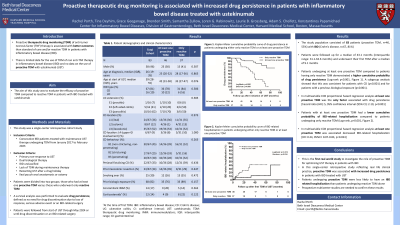Sunday Poster Session
Category: IBD
P0844 - Proactive Therapeutic Drug Monitoring is Associated With Increased Drug Persistence in Patients with Inflammatory Bowel Disease Treated with Ustekinumab
Sunday, October 27, 2024
3:30 PM - 7:00 PM ET
Location: Exhibit Hall E

Has Audio

Rachel Porth, MD
Beth Israel Deaconess Medical Center
Boston, MA
Presenting Author(s)
Rachel Porth, MD, Tina Deyhim, MD, Grace Geeganage, BA, Brenden Smith, MD, Samantha Zullow, MD, Loren Rabinowitz, MD, Laurie Grossberg, MD, Adam S. Cheifetz, MD, Konstantinos Papamichael, MD, PhD
Beth Israel Deaconess Medical Center, Boston, MA
Introduction: There is limited data regarding therapeutic drug monitoring (TDM) of non-anti-tumor necrosis factor therapy in inflammatory bowel disease (IBD). This study aimed to evaluate the role of proactive TDM in patients with IBD treated with ustekinumab (UST).
Methods: This single-center retrospective cohort study included consecutive IBD patients treated with maintenance UST therapy undergoing TDM from January 2017 to February 2023. Patients were followed from start of UST through May 2024 or until drug discontinuation or an IBD-related surgery. Patients were divided in to two groups; those who had at least one proactive TDM versus those who underwent only reactive TDM. A survival analysis was performed to evaluate drug persistence, defined as no need for drug discontinuation due to loss of response, serious adverse event or an IBD-related surgery.
Results: The study population consisted of 83 patients (proactive TDM, n=46, 55%) with IBD (Crohn’s disease, n=67, 81%). Patients were followed up for a median of 43.1 months (interquartile range: 31.1-63.6 months) and underwent their first TDM after a median of 9.1 months. Patients undergoing at least one proactive TDM compared to patients having only reactive TDM demonstrated a higher cumulative probability of drug persistence (Log-rank p< 0.001, Figure 1). In multivariable COX proportional hazard regression analysis at least one proactive TDM was the only factor associated with drug persistence [hazard ratio: 4.8, 95% confidence interval: 1.9-12.5, p=0.001].
Discussion: In this single-center retrospective study reflecting real life clinical practice, proactive TDM was associated with increased drug persistence in patients with IBD treated with UST.

Disclosures:
Rachel Porth, MD, Tina Deyhim, MD, Grace Geeganage, BA, Brenden Smith, MD, Samantha Zullow, MD, Loren Rabinowitz, MD, Laurie Grossberg, MD, Adam S. Cheifetz, MD, Konstantinos Papamichael, MD, PhD. P0844 - Proactive Therapeutic Drug Monitoring is Associated With Increased Drug Persistence in Patients with Inflammatory Bowel Disease Treated with Ustekinumab, ACG 2024 Annual Scientific Meeting Abstracts. Philadelphia, PA: American College of Gastroenterology.
Beth Israel Deaconess Medical Center, Boston, MA
Introduction: There is limited data regarding therapeutic drug monitoring (TDM) of non-anti-tumor necrosis factor therapy in inflammatory bowel disease (IBD). This study aimed to evaluate the role of proactive TDM in patients with IBD treated with ustekinumab (UST).
Methods: This single-center retrospective cohort study included consecutive IBD patients treated with maintenance UST therapy undergoing TDM from January 2017 to February 2023. Patients were followed from start of UST through May 2024 or until drug discontinuation or an IBD-related surgery. Patients were divided in to two groups; those who had at least one proactive TDM versus those who underwent only reactive TDM. A survival analysis was performed to evaluate drug persistence, defined as no need for drug discontinuation due to loss of response, serious adverse event or an IBD-related surgery.
Results: The study population consisted of 83 patients (proactive TDM, n=46, 55%) with IBD (Crohn’s disease, n=67, 81%). Patients were followed up for a median of 43.1 months (interquartile range: 31.1-63.6 months) and underwent their first TDM after a median of 9.1 months. Patients undergoing at least one proactive TDM compared to patients having only reactive TDM demonstrated a higher cumulative probability of drug persistence (Log-rank p< 0.001, Figure 1). In multivariable COX proportional hazard regression analysis at least one proactive TDM was the only factor associated with drug persistence [hazard ratio: 4.8, 95% confidence interval: 1.9-12.5, p=0.001].
Discussion: In this single-center retrospective study reflecting real life clinical practice, proactive TDM was associated with increased drug persistence in patients with IBD treated with UST.

Figure: Figure 1. Kaplan–Meier cumulative probability curves of drug persistence in patients undergoing either only reactive TDM (dotted line) or at least one proactive TDM (solid line).
UST: ustekinumab; TDM: therapeutic drug monitoring.
UST: ustekinumab; TDM: therapeutic drug monitoring.
Disclosures:
Rachel Porth indicated no relevant financial relationships.
Tina Deyhim indicated no relevant financial relationships.
Grace Geeganage indicated no relevant financial relationships.
Brenden Smith indicated no relevant financial relationships.
Samantha Zullow indicated no relevant financial relationships.
Loren Rabinowitz indicated no relevant financial relationships.
Laurie Grossberg: BMS – Advisory Committee/Board Member. Pfizer – Advisory Committee/Board Member.
Adam S. Cheifetz: AbbVie – Consultant, Speakers Bureau. Adiso – Consultant. AegirBio – Consultant. Artizan – Consultant. Bristol Myers Squibb – Consultant, Speakers Bureau. Clario – Consultant. Eli Lilly – Consultant. Food is Good – Consultant. Fresenius Kabi – Consultant. Fzata – Consultant. Janssen – Consultant. Pfizer – Consultant. Procise – Consultant. Prometheus – Consultant. Samsung – Consultant. Spherix – Consultant.
Konstantinos Papamichael: Grifols – Speakers Bureau. ProciseDx – Advisory Committee/Board Member. Prometheus Laboratories Inc – Consultant, Speakers Bureau. Scipher Medicine Corporation – Advisory Committee/Board Member.
Rachel Porth, MD, Tina Deyhim, MD, Grace Geeganage, BA, Brenden Smith, MD, Samantha Zullow, MD, Loren Rabinowitz, MD, Laurie Grossberg, MD, Adam S. Cheifetz, MD, Konstantinos Papamichael, MD, PhD. P0844 - Proactive Therapeutic Drug Monitoring is Associated With Increased Drug Persistence in Patients with Inflammatory Bowel Disease Treated with Ustekinumab, ACG 2024 Annual Scientific Meeting Abstracts. Philadelphia, PA: American College of Gastroenterology.
